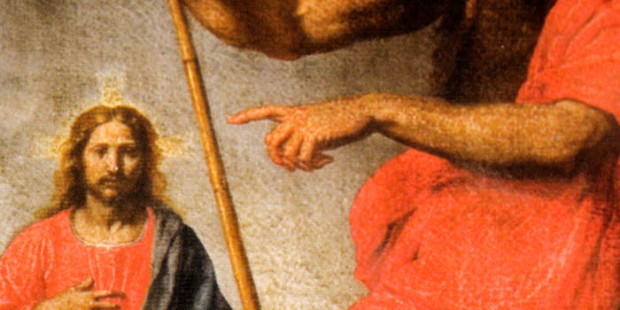Homily for the Second Sunday of Advent
Preached on December 9, 2018 at the Archabbey Church of Our Lady of Einsiedeln, Saint Meinrad Archabbey, St. Meinrad IN
Readings: Baruch 5:1-9; Psalm 126:1-6; Philippians 1:4-6, 8-11; Luke 3:4-6
Big names draw in big crowds. It is a marketing ploy that promoters have used for all sorts of gatherings: concerts, awards shows, holiday specials, even political campaigns. Those promoters know that people will flock to meet this movie star, they will congregate to cheer that celebrity, they will assemble to hear their favored candidate. Those big shots will get top billing because their names are the ones that people will recognize, because they are the “somebody” whom people will want to see.
Luke the evangelist seems to employ this tactic when he lists in the Gospel a veritable who’s who in government and religion: the emperor, the governor, the tetrarchs, and the high priests (cf. Lk. 3:1). These men are so important that events are marked according to the length of their reigns—“the fifteenth year of the reign of Tiberius Caesar” (Lk. 3:1)—time is reckoned according to their terms of office. It seems logical that whoever follows this sort of introduction must be an even bigger name. Whoever follows this list must be a real crowd pleaser.
But John the Baptist is not. Compared to those personages, he is practically a nobody! He is a prophet whom no one has heard of before he came out from the desert (cf. Lk. 3:2). The historian Josephus only mentions John in passing in his Antiquities of the Jews (cf. Book 18, chapter 5:2). This man, whom Jesus says, is the greatest among those born of women (cf. Lk. 7:28) is basically his generation’s one-hit wonder. He preaches one message—a baptism of repentance—and prepares the way of the Lord (cf. Lk. 3:3-4). That is about it: he exits almost as soon as he enters the scene. But John does so because he knows that he is not the main attraction; he knows that he is just the opening act.
As far as opening acts go, John the Baptist is something else. He preaches like something else; he looks like something else; he smells like something else. We know this from the other Gospels (cf. Mt. 3:4; Mk. 1:6). It is interesting to note that Luke avoids mentioning John’s diet or dress. He deletes any description that may distract his reader from listening to this “voice crying out in the desert” (cf. Lk. 3:4). Luke does not let John chew up the scenery; instead, he lets him set up the stage for the One whom everyone has been waiting for: Jesus the Christ.

Jesus: His is “the name that is above every name” (Ph. 2:9). But the name of Jesus has been exalted not because of prestige and power. It has been exalted not by celebrity or notoriety. It has been exalted not from position and privilege. His name has been greatly exalted because “He emptied Himself, taking the form of a slave, coming in human likeness; and found human in appearance, He humbled Himself, becoming obedient to death, even death on a cross” (Ph. 2:7-8).
Here the Lord teaches us what it means to be a real “big” name. He has allowed Himself to be so small—as small as an infant—and that is what makes Him so big. He has made Himself so lowly—as lowly as a condemned man on a cross—and that is what makes Him so great.
Mary too teaches us this same lesson. She herself admits that she is but the Lord’s lowly handmaid (cf. Lk. 1:48). She does what the proud finds difficult to do: she chooses God’s will over her own whims (cf. Lk. 1:38). She lets herself be small so that God alone can be big. That is why all generations now call her blessed (cf. Lk. 1:48).
John the Baptist does the same. He divests himself of everything but his voice so that the Word of God can take center stage. He allows himself to decrease so that the Lord may increase (cf. Jn. 3:30).
Big names may draw in big crowds. But it has been these lowly names who have drawn us closer to Heaven.
Throughout this blessed season of Advent, the Church introduces us to these simple folks whose names their generations have ignored but whom God has exalted. God could have sent bulldozers to fill every valley and excavators to tear down every mountain and hill (cf. Lk. 3:5). He could have used any of those big names to get the job done and they would have done so in record time. Instead, He calls humble folk like the Virgin Mary and John the Baptist and ordinary people like us because it is more than just about getting the job done or drawing in a big crowd. It is about letting God make a big difference in our own lives. If “there is more rejoicing in Heaven over one sinner who repents” (Lk. 15:7), the authentic conversion of all of us may just have the power to move mountains.
Our contrite hearts, more than any big name, may very well be the opening salvo that our Lord awaits before He comes again.